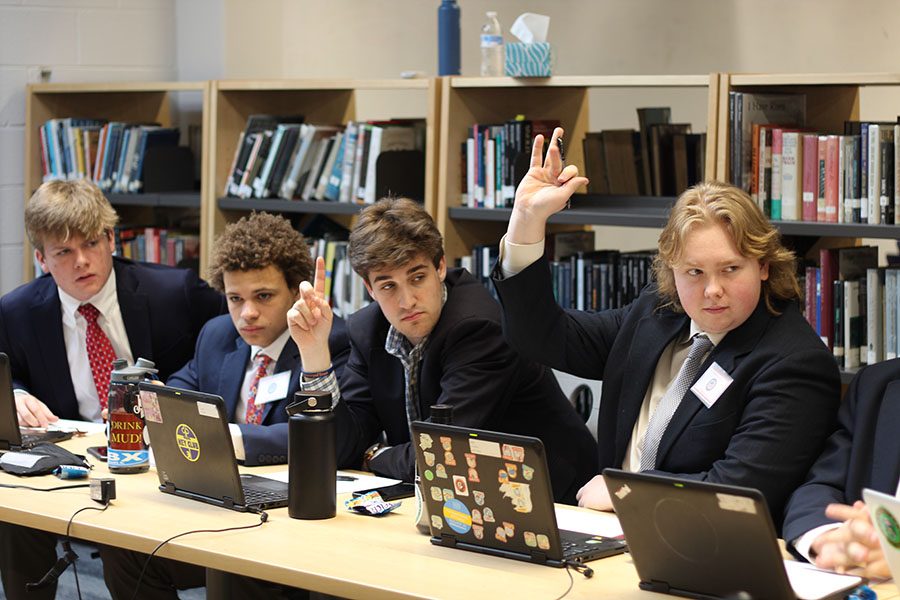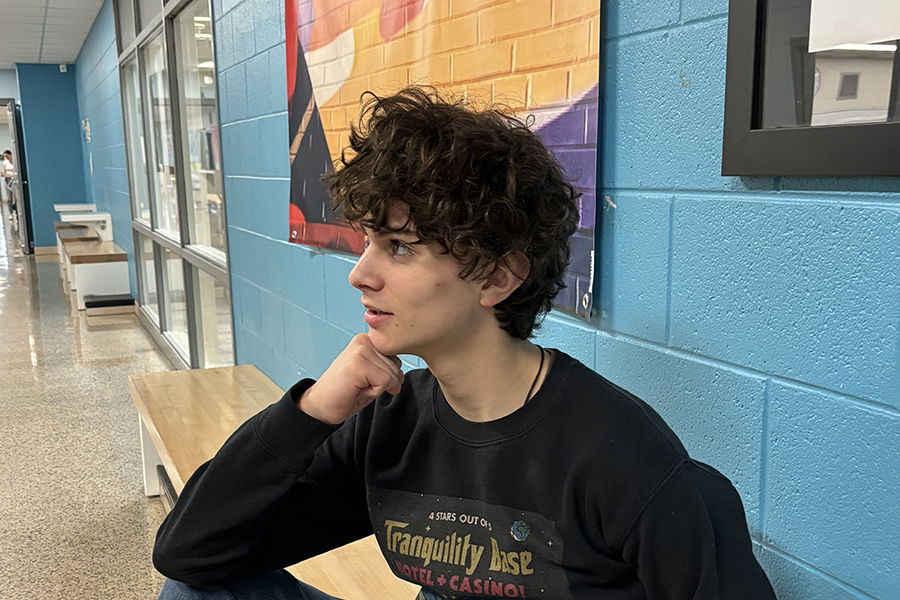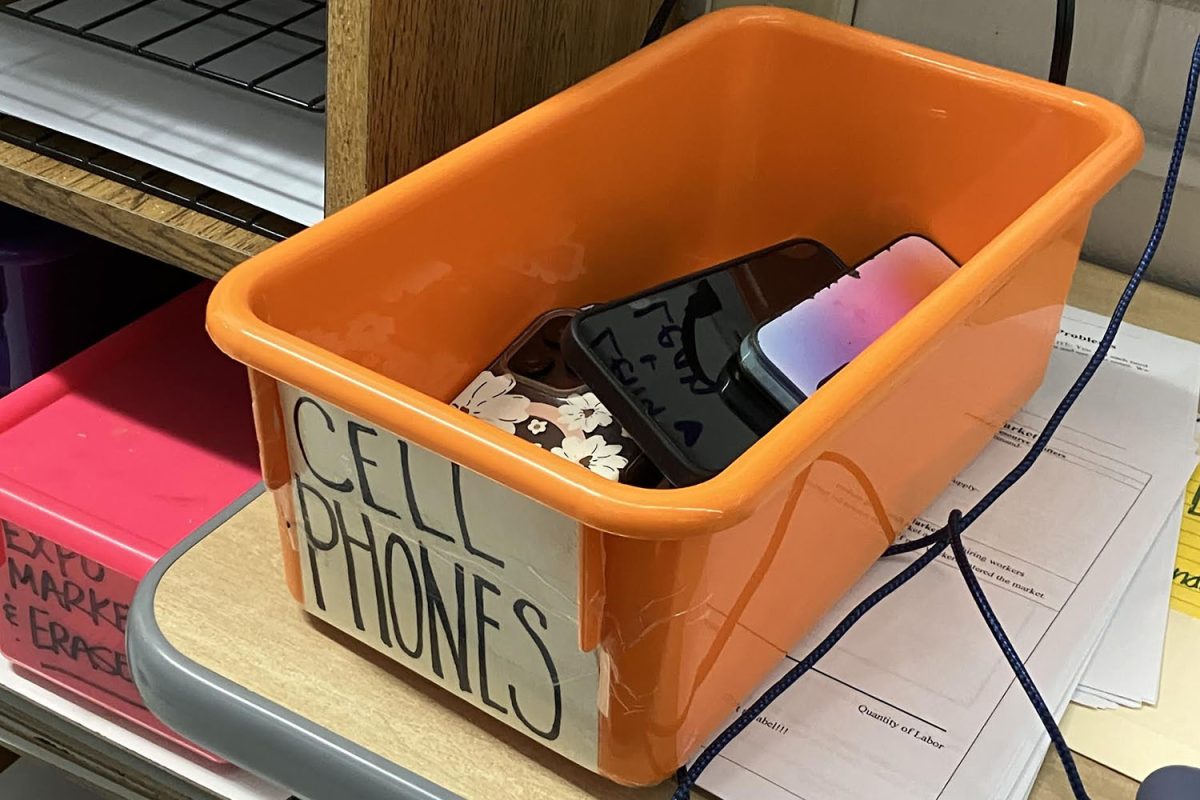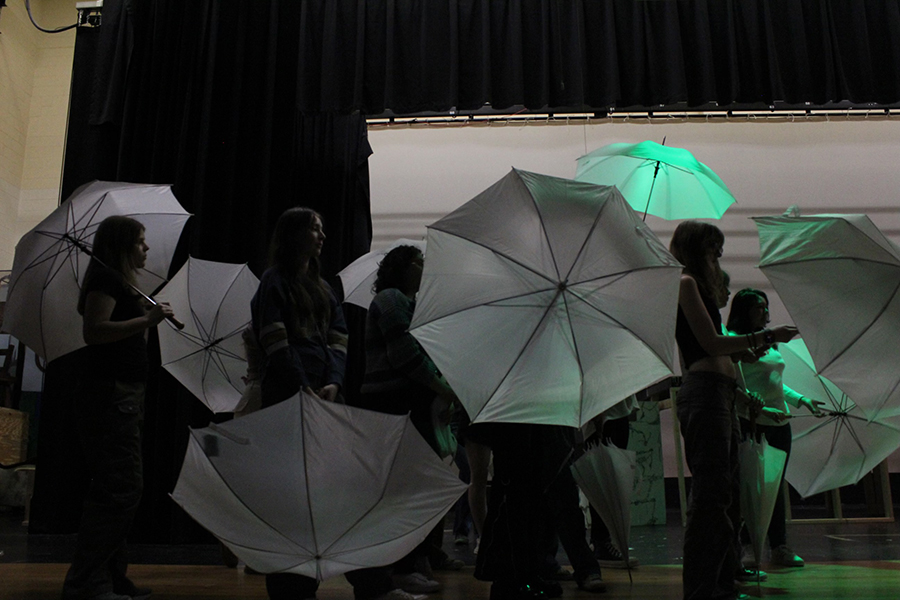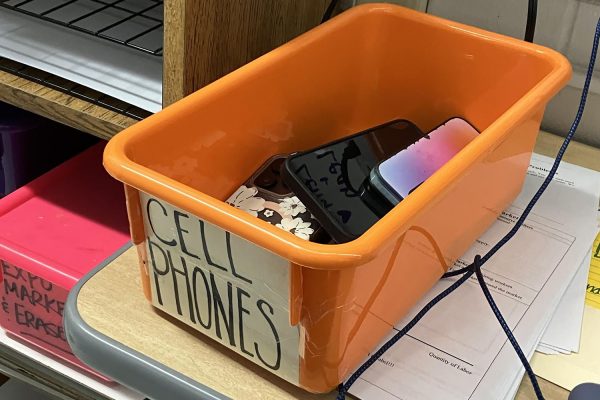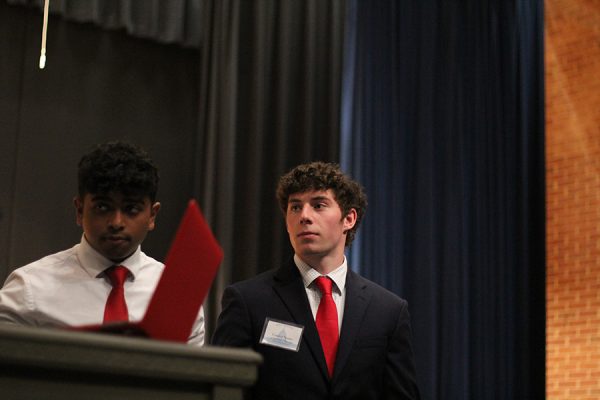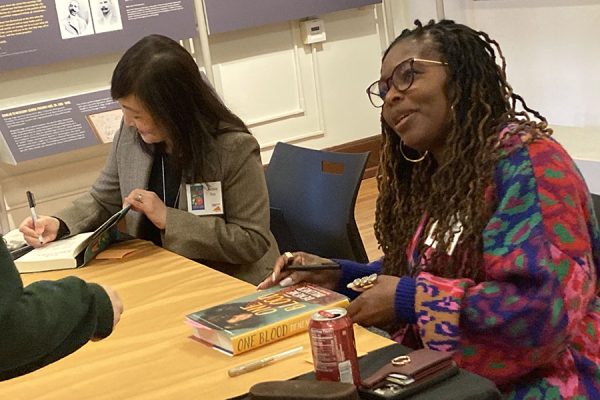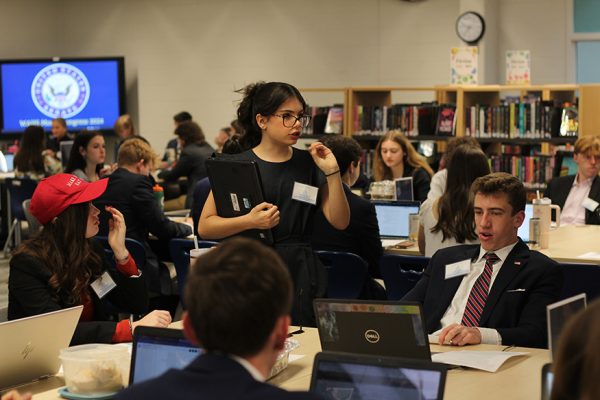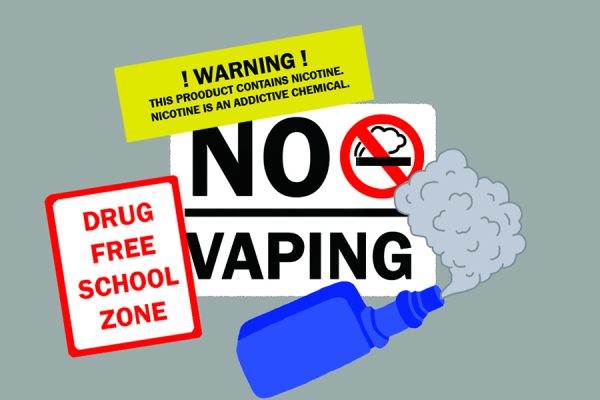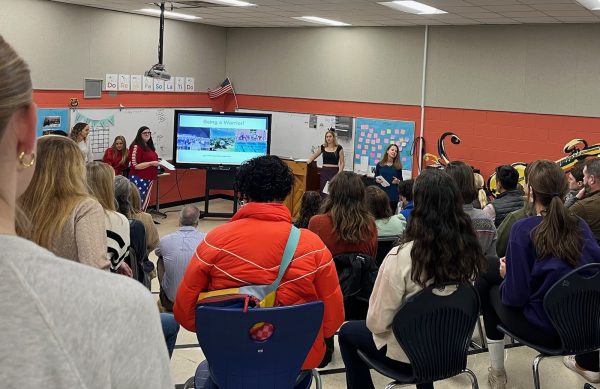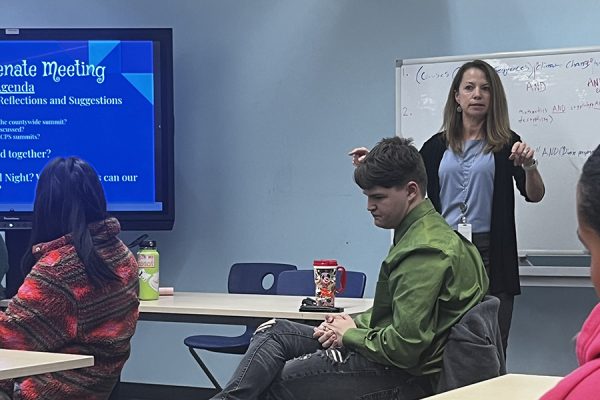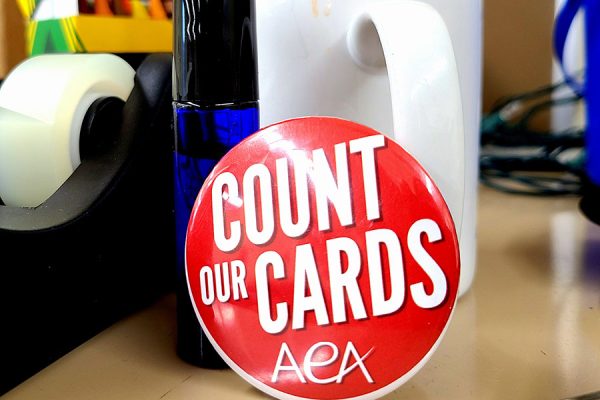Seniors Launch Western’s 15th Annual Model Congress
After a day of lively debate, 11 bills make it to the president’s desk, 7 signed into law
March 12, 2019
Being a senior at WAHS comes with many new opportunities and responsibilities as compared to previous grades. One of the largest, if not largest, is Western’s annual Model Congress event, which is 15 years old today. Seniors, through their U.S. Government classes, are sent to organize a simulation in the school of what our national Congress looks like. This day-long event stems from a multi-week project and involves establishing a variety of different committees who discuss bills created by the students, then attempt to pass that bill and ultimately have the president (coach Bickers) sign it. Our reporters were covering the committees first-hand and gave us more insight into the event.
2019 brought a range of bills, from controversial topics such as gun control and climate change to more lighthearted ones, like eliminating the penny or legalizing the guillotine as a primary method of execution.
After a thrilling day of discussion and several hours of debate, many bills made their way through committees, the House, and the Senate to President Bickers’ desk. After deliberating privately about which to sign and which to veto, he stood and gave his decisions. In the end, seven bills were signed into law. Among them were Senate Bill 212 which placed a tax on plastic bags, House Bill 306 which addressed America’s opioid crisis, and Senate Bill 272- a massive American prison reform. Other bills made it to his desk to receive his signature, while many more were met with a veto or pocket veto. The full list can be found below.
Morning Committee Sessions
Update: Surprise Guest Delegate Steve Landes
9:30 am- Delegate Steve Landes is attending his first Model Congress this year after being invited by senior Owen Thacker, who has worked as an intern at Landes’s office. “I’m amazed that it’s been going on for so long,” said Landes of Western’s 15-year-long tradition. He explained that the Model Congress process is incredibly similar to the real thing. Landes believes that understanding this process extremely important and that Western’s Model Congress is a great way to foster this understanding.
-Julianne Kirby
House: Judiciary Committee
9:53 am- Almost all of the hands shot into the air of the Judiciary Committee and the bill passed with a large majority. The bill proposed that first-time personal possession offenders of drugs should be sent to rehab, as “rehab is a better place” than sending them to prison. When those who are first offenders of personal possession of drugs are sent to prison, 85 percent of the time, they go back to doing drugs once they are out of prison. This proves to be unethical and inefficient. The committee discussed what standards there are for the quantity and distribution amount of drugs needed to consider a felony requiring a fine and potential prison.
Speaker of the house Evelyn Garey and Katrine Berg from the Judiciary committee discuss repealing the death penalty in the morning of Model Congress. “There is an 11 percent chance they are innocent,” Garey nobly addresses. Not only does the death penalty conflict with Garey’s and Berg’s humane alignments, but the economic drainage is greatly impacting the US. Their proposed bill would save them “billions of dollars,” which could be used for benefits in the government. The death penalty is utilized in North Korea, Iraq, Saudi Arabia, China and as of now, the United States. A prominent question in the committee is if the death penalty violates the United States’ paramount dedication to “life, liberty and the pursuit of happiness”? Gauri Prakash goes against the bill stating that “when someone commits a crime, they lose their liberty.” The chair of the Judiciary, Tristan Rose, counts under his breath the hands that are raised in the air, and after a close call, the bill fails.
-Michal Kipnis
House: Education Committee
9:55 am- The House focused on teacher salaries and affordable college tuition. They argued that teachers should have a higher base salary and get paid in higher increments based on the advancement of their academic degrees.“There should be at least one federally-funded college per state that doesn’t look for GPAs. Instead, they’ll be looking at extracurricular activities and teacher recommendations for admission to the college” A member thought the idea was great but was astounded at the proposed cost of the bill, which was estimated to be about 275 billion dollars. “The idea of a free college in America sounds like a dream, but it would be hard to pull that much money from the military and our education budget.”
-Jackson Evanow
House: Environment, Energy, and Agriculture Committee
9:57 am- Discussion in the Energy, Environment, and Agriculture committee focused mainly on the issue of plastic waste, such as plastic bags and utensils. One of the bills suggested a tax on plastic bags, aiming to reduce shoppers’ urge to use the wasteful product. Among the discussions, there was a mention of the shocking statistics claiming that 90% of the ocean is composed of plastic waste. Another bill suggested a ban on plastic straws. Overall, this committee is aiming to move towards “a more ethical direction”, as one senior claimed, in relation to the country’s waste production and efforts to protect the environment.
-Alex Noth
Senate: Health and Agriculture Committee
10:00 am- Emily Flanders from the Health committee calmly yet confidently proposed her bill for lowering the standard for chromium in the United States drinking water. Throughout questioning, everyone was intrigued but had some doubts. “Would commercial areas have the same standards as residential areas?” and “How would you take the chromium out of the existing water?” were some of the many questions asked to Flanders who answered them with confidence. After some more debate, the bill was tabled to be revisited later.
-Lily Marcel
House: Environment, Energy, and Agriculture
10:06 am- Discussion in the Energy, Environment, and Agriculture committee focused mainly on the issue of plastic waste, such as plastic bags and utensils. One of the bills, proposed by Julia Berg, suggested a tax on plastic products in order to help the marine environment. The money earned from the tax would be contributed towards plastic recycling programs. Alayna Garrison also focused her bill on the removal of plastic waste, suggesting the utilization of a “Water Cleaning Machine” meant to remove debris from the water and safely dispose of it. There were also efforts to protect endangered animal species and advocate for the humane treatment of livestock, such as Senior Gabriel Dunovant’s bill proposed an attempt to save the Red Wolves, and Jada Sims’ focus on promoting better treatment of farm animals. A strong emphasis was placed on the importance of renewable energy in our industrial nation, with two bills proposing methods for the increased use of renewable sources. Overall, this committee focused on moving the country in an increasingly ethical direction in terms of environmental conservation and protection.
-Abigail Connelly
Floor Session I
House: Michael Shutt joins Model Congress
11:00 am- This year is the first time that Mr. Shutt has participated in Model Congress as it is his first year teaching at Western Albemarle. This gives him an interesting perspective on the events throughout the day. He said, “It’s fun. It’s kind of hectic. It’s crazy. There’s a lot of fires to put out as they go through committees, but really the thing about the day was that the kids really took over. And so actually, it’s a lot of fun to see them kind of run things and I can sit back and relax.”
-Brian O’Dea
House: Floor Session I
11:38 am- The House of Representatives discussed the bill introduced by Ricky Rao to allow immigrants seeking asylum into the United States. Vote: passed.
11:44 am- Bill 770: Protecting our world through carbon emissions reduction, proposes a shift to renewable energy from the usage of fossil fuels. Companies have until the year 2050 to secure 50% renewable energy. Noa Kipnis claims that Lamb’s bill is cheap, costing around 10 billion dollars per year until 2050. A resolution by Congress and recognition of reusable renewable energy. Vote: passed.
11:52 am- Bill 603: Cease the support of Saudi Arabia with arms and technology in the war with Yemen proposed by Charlie Cowen. This is a temporary removal of arms and supplies until the cease of unnecessarily violent activity. Saudi Arabians have used US materials to kill or injure millions of civilians. Cowen believes that the bombing of a school bus full of children by Saudi Arabia with a US bomb sends the wrong message to other countries about the goals of the United States. The bill passed 81-61.
12:01 pm- Bill 101: Install public preschools nationwide to accommodate children 3-5. Only 60% of children this age are in preschool because preschool is very expensive and children who do not go will be behind. Preschool develops social and analytical skills that are vital to children at this age. “Education is a right. Nobody should be ahead of anyone going into kindergarten” This will cost approximately 3 billion dollars per year. Vote: passed.
-Sidney Jackson
Senate: Floor Session I
11:35 am- Opioid bill: Reclassifies opioid, fewer pills prescribed. Bipartisan, majority and minority leaders agree. No opposition speakers, no votes against, passed the floor.
11:48 am- Senate bill 507: Universal pre-K for low-income families. Democrats argue that preschool can close the economic gap because of the benefits of preschool (statistic quoted: $9 return on every $1 spent) Republicans are resistant because of how much funding it would require. Quoted a study that Headstart did not actually help. Split vote, had to count, passed.
11:58 am- Senate bill 272: Prison reform bill: bipartisan- Democrats argue that private prisons are bad. Components: 1. Banning solitary confinement, 2. For-profit prisons are worse, don’t rehabilitate prisoners or pay their guards enough, cost government too much. 3. Juvenile justice- make juvenile prisons more rehab and less punishment. Republican leader agrees. Republicans question how solitary will happen. Say that prisons are overcrowded so private prisons are necessary. Vote: passed.
12:05 pm- The LCD Act: Caps public tuition. The democratic leader doesn’t fully support, the state makes a lot of money off colleges. Republican leader agrees, putting a cap at $15,000 would not help. Vote: did not pass, overwhelmingly
12:15 pm- Equal Vote Act: Democrats argue that voting is being suppressed from people of color and minorities. Improved access for everyone to vote, ending gerrymandering. Cited Arizona as an example of a successful end to gerrymandering. Make Election Day a federal holiday. Republican leader agrees. Senator Thacker, Republican, says this isn’t the way to fight division, maybe amend it. Vote: split, had to count, passed.
12:20 pm- Vaccine bill: mandating vaccines. Children would need vaccines to go to public schools. The opposition argues that it is unconstitutional to make people have debates Vote: passed.
12:34 pm- Bill S604- COLA Act: protect minorities from police brutality by using body cams. Democratic leader argues that body cameras increase accountability on police. Senator Wyatt Thomas says that states that have this already have more accountability, would cost $96 million. Cameras would also help identify suspects if that is necessary. Republican leader and speakers agree, say that it would help find criminals too. Amendment proposed to include a new provision that mandates that the body cams are always on. Amendment passed, added to the bill. Bill passed unanimously.
12:43 pm- S527- re-entering the Paris agreement to protect the environment. Argued that renewable energy both creates jobs and helps the environment. Senator Max Tracey, R, argued that it would be too expensive and cost 6.5 million jobs switching to different energy and incomes would lower. Cites an MIT study that said that the total change in earth’s temp would be .2 degrees, not enough to justify the sacrifices. Other Republicans argue that jobs would be lost and income would lower, and there is no set plan for the Paris agreement so it is not safe to enter. Democrats argue that .2 is actually enough and would have a large impact. Vote: passed, but close.
12:49 pm- S212- plastic bag taxation to reduce plastic bag usage. Democrats argue that it would keep micro-plastics out of the ocean and environment. Mandates that all big business food containers be biodegradable by 2022. Republican leader argues it will harm the consumer. Vote: passed.
12:53 pm- S609- retiring the penny. Democrat leader argues that it won’t change much. Republicans agree, will save $69 million. Democratic senator argues that it will harm our relationships with China because they have a big zinc export. Vote: passed overwhelmingly.
-William Peritz
The End of the Road: President Bickers’ Final Decisions
- S683 (To reduce gerrymandering and make election day a national holiday)- Bickers determined it was a states’ rights issue, not a federal one. Neither signed nor vetoed.
- S527 (To Re-enter the Paris Accord)- Vetoed
- S272 (To reform public prisons and juvenile detention centers, eliminate private prisons )- Signed into law
- S604 (Requiring police to wear body cams at all time)- Signed into law
- S609 (Eliminating pennies)- Signed into law
- S212 (Plastic bag taxation)- Signed into law
- S608 (Legalizing the guillotine as America’s primary method of execution)- Signed into law
- HB306 (To address the opioid crisis)- Signed into law
- HB770 (To address carbon emissions)- Pocket Veto
- HB514 (To address the non-consensual posting of indecent images online)- Pocket veto
- S507 (Universal Pre-K for low income families)- Signed into law



